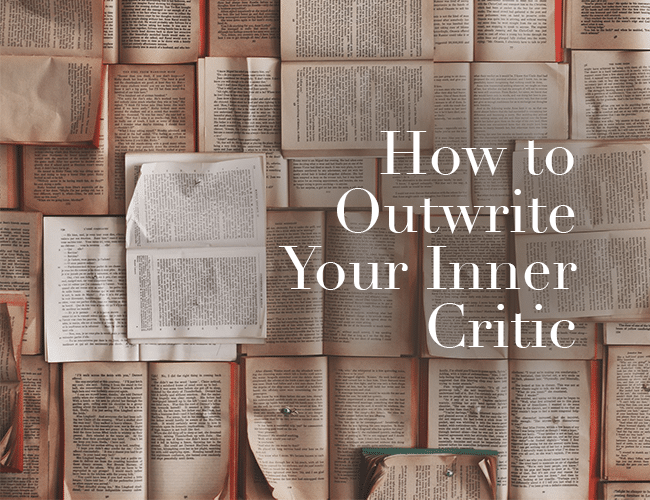When I first started writing seriously, I burned everything I wrote because I was afraid of anyone reading it.
Then, when I began my English degree, I talked about other people's writing confidently, but anytime I tried to do writing of my own I completely froze.
And when I published my first blog post, I was filled with so much anxiety that after hitting “publish” I chased it with a few stiff drinks.

The reason I'm sharing this is because I now know my inner critic was the cause of each of these moments of self-doubt. In this post, I want to show you to out write your inner critic.
The experience of the inner critic is universal. Because it's part of the creative process, the clearer you understand the inner critic, the more power you have to combat it, outsmart it, and write with confidence.
What is Your Inner Critic?
The inner critic is a psychological concept used to describe a part of your personality that judges or demeans yourself and your work. It's the voice that makes you feel small, not good enough, and blocked.
Often the inner critic is described as having a big booming voice. Or as aggressively telling you that you are wrong or that you shouldn't have started.
However, I've found that it often shows up nuanced, gentle, with the illusion of “normal thinking,” which makes it difficult to tell the difference. For example, my self-doubt voice can sound the same as my excited and inspired voice. They both sound like me.
The difference is that one is energized, expansive, and inspired. The other is constrictive, fearful, and limited.
It's random nature is what gives the inner critic power. It has a way of sneaking up on you, getting in your way, before you even know what's happening.
As writers, it is so important to know all the sneaky ways the inner critic can show up. This gives you an advantage because you can anticipate and spot the critic for what it is, and choose to keep writing anyway.
How the Critic Shows Up and What You Can Do
I've found that the critic shows up in three different domains: mind, body, and spirit. And there are different ways to diffuse the critic's power in each domain,.
MIND:
The inner critic is ultimately a thought system that limits what is possible. It shows up when you feel stuck, when you have a problem you can't seem to figure out, when you over think, or analyze yourself and your work.
It shows up when you have critical thoughts. “Who am I to write?” it whispers. “I don't know what I'm doing.”
When you find yourself thinking like this, recognize the thought as the critical voice and counter it by asking yourself, “What other way I could look at this?” Your non-critical voice will jump the opportunity to respond.
BODY:
I've found that my inner critic often shows up somatically. When it does, my body starts to hunch, I feel constricted, and unconsciously start taking short and shallow, breaths. I physically turn inward and become smaller.
When the inner critic strikes, you play small by making your posture small. One of my favorite TED talks explains how posture affects your brain chemistry.
When your posture starts to shift, notice it. Then take this awareness as an opportunity to straighten, ground your feet on the floor and reconnect to your breath. This clears blocks and allows you to continue typing away with ease and confidence.
When the critic shows up in your body, you don't get into a flow with your writing.
SPIRIT:
The inner critic manifests when you feel uncreative and uninspired. You don't experience words flowing and sparking through you.
When this happens, remind yourself you are creative, abundant and extremely capable, but the critic is preventing you from experiencing that in the moment.
Another way to counteract the critic when it shows up on this level is to practice gratitude. Take a moment to reflect on the places in your life where you feel creative and alive. Keep a running list, write in your journal, remind yourself of the creative spirit you are.
The Function of the Inner Critic
A question that often comes to mind is why do we have this critical part of ourselves in the first place. What function does it have?
What puts me at ease and helps me keep writing through my inner critic's attacks is seeing the inner critic as a means of self-preservation. Its function is to protect us from the vulnerability of stepping out of our comfort zones and expressing ourselves.
For me, remembering that the inner critic is trying to protect me helps to make it less demonized. I can come into relationship with it in a different way. I understand my critic is there, doing it's job and I can listen to it, thank it, and then move on.
A New Relationship
By increasing your awareness of how the inner critic shows up for you, you take your power back. You build internal muscles that experience keep you writing despite its pressures to get you to stop.
The more I write, edit, publish, and repeat, the more I see my critic for what it is: simply a part of myself that comes along for the ride.
The way the critic shows up will be different for everyone based on your own experiences. However, you are not alone in experiencing its presence.
Ultimately, the critical voice is a small voice compared to the creative potential and aliveness that you are at your core. The inner critic may feel big in the moment, or slither in like a sneaky snake, but by remembering the bright, creative and inspired reality of who you are, you stand your ground, stand in your potential, and write energetically with courage and heart.
Have you observed the inner critic's voice in your writing? How did you handle it? Let us know in the comments.
PRACTICE
Free write for ten minutes and pretend you are an anthropologist watching yourself write.
Afterward, write your own writer's manifesto, outlining how your inner critic showed up and how you will counter it when it sneaks into your process.
How did your inner critic show up? Share your manifesto in the comments section.
Happy writing!







Hi,
I started to write ten years ago. In fact i started at the age of seventeen but in secret because writing in my environment is absurd. I think is absurd but in reality I was not the sole to think like that. All the people (in my environment) despise literature in general and writing in particular because deep in their heart they find it awsome, so great that it frightens them. I started to write when a teenager and then stopped. I came at the age of fifty. I wrote my novel then I said ‘I may be not mine!’ Why that? My inner critic convinced that I was too much influenced by great writers, writers such as the English 19th century’s ones. I may be a plagiarism. I rewrote the novel, transformed it, destructed it and put it aside. I started a second one and said to myself ‘ You are writing like a good pupil’. Your words are too clean, self censure. The same thing recommenced, transforming, distructing, changing and putting aside. I started the third one. You need to be a rebel, to break taboos. I dared to be more audacious. And continued like that. Now I am very audacious, I use humor, laughing at myself and using even strong words. And now I came back to the starting line and regret my liryc side. Finally I am a writer who published nothing but continuous to write and criticises himself.
Please do not pay too much attention to the poorness of my Englsh. I do not master your language yet.
Madani, Thanks so much for sharing your experience. What stands out is how the critic can come up in so many different forms. Your courage to keep writing in the face of the different layers of the critic, is inspiring. Keep up the great work!
I admire your perseverance!!
Hi
I admire you for even starting a novel. I’m too blocked by my inner critic to meet tonight’s deadline, and complete a 3-4000 word piece for creative writing portfolio. Do you want to know the truth? I haven’t even started it yet. Not laziness, I’m reading every short story on my bookshelf. I’m paralysed with terror. Now I truly appreciate great writing and am wishing to emulate the techniques I am unable to stop reading and start writing.
Suggestion. Look up the definition of pastiche, pick something you like and write it as a pastiche. I’m not suggesting you copy, I’m suggesting you imitate, which, after all is flattery.
This is what I am finally learning as I read authors whose work I admire. I’m having to re-read several times in order to identify specifically what it is that works. Use of detail, turn of phrase, … and sentence structure even. I’m only just beginning to comprehend how these things are useful for my own writing. I can imitate yet not copy. Pastiche is great, thank you for this because It clarifies what I am just beginning to realise will help
Anna-Rose, Thank you so much for sharing! You are not alone in your struggle and giving your process voice (such as you’re doing here) shows your bravery and desire. Awesome! I love Gary’s advice and just know that everything you do is progress. Keep exploring and visioning. Start with one word, one line, one paragraph, the story that’s bubbling inside of you will come to form. <3
Yes! … advice that supports calming progress.
Thank you Jackie. I managed to get to the class last night, and this helped to remind me I am not alone in my struggle. I have until 4 April to get the 3-4000 word story ready to share with the workshop. I think I can do it now. All that reading wasn’t a waste of time either. But I must beware the lack of focus that comes about whenever I get the ‘overwhelm’ feeling. One word, one line, one paragraph…
I hope by now you’ve made a start.on your project. I don’t think it’s so much the troubling inner critic; it’s the towering mountain over you. The older I get, the more I realize how squelching, uninspiring, and usually unproductive, to think in terms of a whole article, a whole story, a 3-4K piece. (Or clean the whole house or tackle all the mountain of dishes/laundry, etc.)
I’d encourage you to think in terms of an opening paragraph only. Construct that ONE paragraph in your mind, then key it in. Then do the next one. Eat the elephant bite by bite. It’ll knock you over if you try to eat it all at once.
Yes! Nicely put, Christine.
Such great advice Christine! Thanks for sharing our experience.
I love your advice, you express the dilemma well, using the analogy of housework tasks. This sense of ‘overwhelm’. I hope that by breaking it down into more manageable steps, and getting pen to paper in a less self-judgemental way is going to break this deadlock. Then I need to make it a habit. Like the good old days. Must keep it simple though. Reminder to self. Thank you!
How about finding inspiration by re-reading a subtly exhilarating phrase that YOU have created or a word choice which exudes your intent in a favorite piece or a plot twist you constructed that surprises even you.
Ooooooo I love this, Susan. Brilliant!
wow … all those OoooooS and the words that follow circled my heart with a hug. thank you, Jackie!
In reading your comments and advice to myself and others, I appreciate your style.
I agree with Jackie … you show great courage by stating your truth.
I often sabotage myself by letting fear completely spin me around. Recently when I was talking with friends about feeling unfocused and inefficient and a bit stuck, I used “fear” as the factor to explain it, but I quickly had to clarify what I meant by fear… fear of WHAT?
That’s another topic, but what I do want to share is a comment in another TWP post quite awhile ago that has stayed with me … “set the fear free” ! I LOVE this variation of “face the fear” and “release the fear”. In my imagining of this, fear flies away (as when doves are released), which means it gets further from us more quickly. And … fear WANTS to be free from us as much as we want to be free from it. (Now there’s a story.)
Thank you. I made it to class yesterday, although I explained to my tutor that I have been in a state of fear/paralysis/block. I’m completing an Alevel in Creative Writing, and so it’s expected of me that I complete set tasks at set times. I found it hard to ‘justify’ not handing in my portfolio piece for class workshopping, but I’m glad I still have time to make a start before 4 April. I am going to return to the days when I kept a diary/dream diary. It’s the lack of habit, and therefore flow which doesn’t help. Baby steps!
The inner voice that criticizes your writing can and must be harnessed to make the aesthetic (critical) judgements that that will take your writing to the next level. If your inner voice is saying “it’s not good enough,” or worse, demand that it help you to figure out how to do it better. Don’t drink or do drugs! Writing is really, really hard. You’ve got no Ford Maddox Ford or Maxwell Perkins to tell you (as they told Conrad and Hemingway) “get rid of that, tighten this up, and give me more like here and here.” You have to figure it out all by your lonesome. It’s brutally hard, much too hard for most. But your inner voice – cruel as it is – might be your only true friend.
Scott, agreed! I love how you put this: “Your inner voice – cruel as it is – might be your only true friend.” I think coming into relationship with the critical voice, in new ways, is so important to harnessing it as an ally. Thanks for sharing your thoughts.
If you learn to channel your inner critic, it can become your best friend. And without seeing the bad, you wouldn’t know the good. When I tell someone they write great dialogue, that’s because I’ve read terrible dialogue and know where it can go wrong! Without our inner critics, we wouldn’t be able to appreciate the stories that make our hearts sing (and we wouldn’t know why they make our hearts sing.)
Rosie: yes, yes, YES! I love this: “Without our inner critics, we wouldn’t be able to appreciate the stories that make our hearts sing (and we wouldn’t know why they make our hearts sing.) Agreed <3
I do have the “inner critic.” And, it’s good and it’s bad. It is also shared by my ” significant other.” Last night, he told me that I am publishing “too fast.” I self-publish books so when I’m ready I submit my work. He said that I could be writing “5-dollar books.” That I don’t take my time. Now, I already told him that I should have been writing years ago but I was too afraid. I have so many stories that it appears to be “rushed.” He is trying to write a novel himself.
Thanks for sharing LaCresha! Great point about how the inner critic can show up in interpersonal dynamics. I think it’s such a normal experience that we don’t always talk about. Thanks for giving it voice. And, congrats on publishing, that’s wonderful! Your fire to create is inspiring.
Inner critic. Outer critic. Voices in my head. Voices in my ears. Whispers on the wind.
“I can’t.”
What do you mean you can’t?
“Just what I said, I can’t.”
Oh for goodness sake, just press the damn key.
“You’re not listening. I can’t.”
You mean you won’t, not can’t. There’s a difference. Can’t implies you are physically incapable of pressing the enter key. Won’t mean you can physically press it but you’re too damn scared. Just press the key and let’s go get ice cream to celebrate.
“No. When I press that button everyone in the world will know.”
Know what?
“Know that I’m a fraud. I tried to write a book.”
You did write a book. And a good one.
“Perhaps, but not great. I should wait until it’s great. Another few years won’t matter.
Press the damn button. This is getting old. You’ve been crying the same song for a year now. You wrote a book. You had it edited. You worked hard to improve your skills. Just press the damn button.
“What if the world hates it. What if I only get one star on Goodreads?”
At least you got a star. Some books don’t get any. Think of Michael Bay.
“Why?”
Because he produces movies for himself. He has fun blowing things into the sky and doesn’t give a fig about critics. Be Michael Bay. Press the damn button and blow the sky wide open.
“But …”
Just press the damn button. I’m hungry.
My goodness, Jackie,
Coming off from submitting a story for the Fall contest and feeling good about the process of writing, being critiqued, writing, etc., I felt comfortable in taking the ten minute challenge and this is what I came up with. Perfection and fear of failure is what my inner critic is all about.
Now that I am aware of how my inner critic works and your thoughts in your article written,
I will be more conscious and make friends with my inner critic – even be grateful!
Fun to comply with suggestion made.
Today is the first day of the rest of my life. I don’t know
what tomorrow will bring, but I sure do know that today is almost over. It is
amazing what comes to mind knowing darkness is starting to pervade the sky.
Well here I go, again, guessing about nothing and do
nothing.
Look at me, can’t you see I want to do all things and then
do nothing.
Well! Here is what I have to say about that.
First things first, what is my passion – to write.
Then write on young lady.
What do you want to write about? Life in this day and age is what I want to
share.
Why? Because when you are fully alive you want to share your
thoughts with others.
How do you know you are fully alive? It is when you wake up
in the morning, make plans and then go full steam ahead with life.
HUH? Okay so that is
not exactly what happens.
I’m finding out I want to be perfect and then not all things
get done.
Oh! So I have to speak to myself and say it is okay to make
mistakes.
You mean what you discovered with writing in the fall
contest. Exactly!
Those who critiqued my material – with good constructive
wisdom, allowed me to recognize I can show my mistakes and go forward.
So what else is holding me back? Organization!
How is that? Well, I
try to take time to do my chores and find I return where I’m feeling good about
myself instead of focusing on what needs to be done.
Is there any way to overcome this malady?
It is not a malady, what is it?
IT IS THE INNER CRITIC TRYING TO PROTECT ME FROM FAILURE!
WHAT? HOW DO YOU KNOW? BECAUSE I FEEL IT IN MY BONES!
Wow! So this is what writing for 10 minutes is about.
Finding out about yourself.